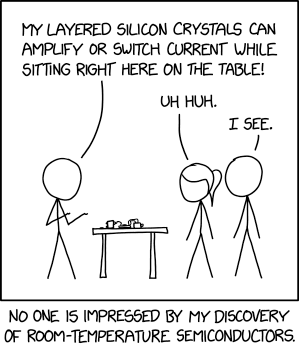

I should note that there’s also the option to simply save a post or comment (the star in the web interface). It can then be found under “Saved” on your user page.


I should note that there’s also the option to simply save a post or comment (the star in the web interface). It can then be found under “Saved” on your user page.


Wait until you learn about negative downvotes.

and anti-upvotes



Are you in the All tab? You can also sort by most comments (that doesn’t take recent activity into account, but for that there are other sorts). If you are only finding dead communities, it probably means you have reached the end of lemmy and that there is nothing more to see.


Couldn’t scaled sort or new sort in the all tab already do that? There’s also the community browser. You can sort communities by different criteria there.


(for the outsiders: the joke is that hexbear has no downvotes (they are disabled (the downvotes)); hexberians can’t downvote and downvotes don’t affect the total score of a comment from hexbear’s view)
(me not lawyer nor study law)
I’ve seen some users add a license to the end of each of their comments. One idea might be this: Add a feature to Lemmy where each user can choose a content license that applies to everything they post. For example, one user might choose to no rights for their content (like CC0) because they don’t care how their data is used. Another user might not want companies profiting off their posts, so they’d choose a more restrictive license.
I don’t think licensing your content prevents it from being used in AI models, considering that services such as Copilot were trained on data such as GPL licensed source code without having to comply with the terms it imposes when modifying or copying GPL licensed code (but it’s not just resticted to restrictive licenses such as the GPL, since according to licenses such as the MIT they would also have to credit the authors of the original work). It seems that, for now, copyright law doesn’t apply to data generated by AI models and that they don’t need to comply with the terms of the licenses of the training data (or at least they don’t seem to have been penalized for violating copyright law yet AFAIK).
And even if it wasn’t licensed, companies can’t use your works without your permission (unless it constitutes fair use). When you license a work, you are simply giving permission to other people to do things with your work they would otherwise not be allowed to do.


Would be interesting to use such an embedded image to acquire some statistics on lemmy users. We could answer questions like: What percentage of lemmy users use Linux?


room temperature semiconductor



So one can vomit on their server in return.


I’ve been thinking: What if we add ipfs into the mix?


Is the top bar supposed to not be using the entirety of the available horizontal screen space?


For software development I would have thought of Lojban (the logical language). It’s supposed to be syntactically unambiguous, so there are even parsers for that language.
Esperanto seems to me kinda… meh. Like, if we are going to do something as ambitious as establishing an IAL, why not shoot for the stars? Why not choose something that by some standard most of us can agree on, is the best of all for the job (not saying Lojban would be one, since it doesn’t even aim to be an IAL)? Let’s say ease of learning was one of the most important criteria: Then toki pona or some other derivative could be something we ought to look at. Or maybe even create and entirely new language. The one thing I see that Esperanto excels in is its popularity, which is useful to avoid the “Why would I learn that language if no one else speaks it?” situation, but I believe we should go beyond that if we have the choice of establishing an IAL.
I’ve never played it, but aren’t League of Legends servers already authoritative?
Also, I’m pretty sure it would only deal with certain kinds of cheats. An authoritative server won’t be able to prevent a player from using an aimbot, for example, since nothing says that a player isn’t allowed to have super accurate aim. The server can’t tell if they are cheating or just insanely good.Nevermind I missed your sentence mentioning *-bots.I wonder whether, even with an omnipotent anticheat software installed, cheating would still be possible by having the router manipulate your packets on the way to the server (ie. having all the *-bot work being done on that device). I imagine TLS could maybe thwart that attempt, since the router can’t decrypt the packets, but I don’t think it’s really a problem since the client could also just provide it with the unencrypted packet and the server’s public key, so that the router may fabricate the packets. On the other hand, anticheat software would be aware of that since the client has to send those extra packets, but how could it know that those packets are being sent for nefarious purposes and not just simply some other normal software doing it’s thing?